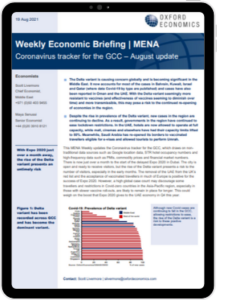MENA | Coronavirus tracker for the GCC – August update

The Delta variant is causing concern globally and is becoming significant in the Middle East. It now accounts for most of the cases in Bahrain, Kuwait, Israel and Qatar (where data Covid-19 by type are published) and cases have also been reported in Oman and the UAE. With the Delta variant seemingly more resistant to vaccines (and effectiveness of vaccines seeming to diminish over time) and more transmissible, this may pose a risk to the continued re-opening of economies in the region.
What you will learn:
- Despite the rise in prevalence of the Delta variant, new cases in the region are continuing to decline.
- As a result, governments in the region have continued to ease lockdown restrictions. In the UAE, hotels are now allowed to operate at full capacity, while mall, cinemas and elsewhere have had their capacity limits lifted to 80%. Meanwhile, Saudi Arabia has re-opened its borders to vaccinated travellers eligible for e-visas and allowed tourists to perform Umrah.
- This MENA Weekly updates the Coronavirus tracker for the GCC, which draws on non-traditional data sources such as Google location data, STR hotel occupancy numbers and high-frequency data such as PMIs, commodity prices and financial market numbers.
Tags:
Related Services

Post
US Rolls Up Welcome Mat for International Travel
Research Briefing MENA | Coronavirus tracker for the GCC – August update Trump tariffs set to raise effective rate above 1930s levels.
Find Out More
Post
Initial takeaways from Trump’s ‘Liberation Day’ announcement
In two or three years' time, US imports could fall by around 15% due to discounted reciprocal tariff hikes.
Find Out More